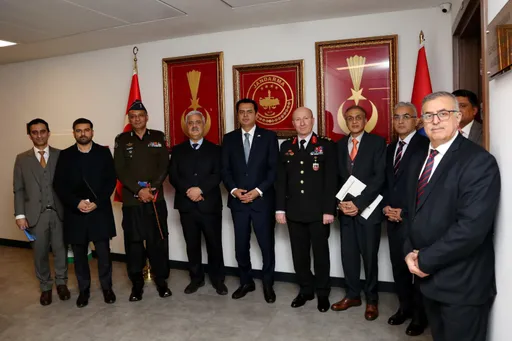“First of all, it is a very rare condition,” says Assoc Prof Senol Emre, who was in the surgery team to separate siamese twins in Istanbul, Turkey on November 14. “It is seen more often in Africa and Southeast Asia, and less so in Turkey, the Middle East and Europe.”
“The occurrence rate is one in 500,000,” Prof Gonca Topuzlu Tekant, the senior member of the surgery team, tells TRT World.
The siamese twins, identical twin girls called Elif and Nil, were born on November 4, 2020 in Cerrahpasa Hospital in Istanbul. “They had to be delivered at 35 weeks plus 6 days, rather than the usual 40 weeks of pregnancy,” Tekant says. “This was because the more they grew in the womb, the more the risk. So our team planned on a Caesarean delivery.”
Tekant, who is now the senior member of the Pediatric Surgical team, says she was a junior member of the team that delivered another pair of siamese twins 20 years ago at Cerrahpasa Hospital. “Maybe you’ve heard of them, Elif Nur and Sema Nur? They are university students now.”
The newborns had to be separated soon after birth, because one of them, Elif, has a congenital heart defect called ‘great artery transposition’ which means the two main arteries leaving her heart are reversed. Baby Elif will have to undergo cardiac surgery as soon as possible, once she recovers from the effects of the separation surgery.
Usually, separation surgery is made around eight to ten months after birth. But Elif’s heart defect pushed the timeline forward. Tekant predicts that her sister, baby Nil, will make a faster recovery, and will be discharged sooner, but she is hopeful about both babies.
“We have them on IV fluids, of course, but we have also started feeding them with mother’s milk as well. They are showing rapid progress even if it has only been eight days since their operation.”
According to Tekant, the team of doctors operating on the babies planned ahead far in advance, discussing how they would perform the surgery in meetings. The operation that lasted 11 hours was deemed a success.
Emre says his specialty is liver and bile ducts in pediatric surgery, while Assoc Prof Rahsan Ozcan specialises in chest surgery. Prof Tekant is an expert in abdominal wall defects, while Assoc Prof Semih Baghaki is a Plastic Surgeon well-versed in solving cases with missing tissue.
Baghaki tells TRT World: “The operation was started with separation of skin, abdominal muscles, ribs and the chest bone by Assoc Prof Semih Baghaki. Then Assoc Profs Senol Emre and Rahsan Ozcan took over and they separated the liver and biliary structures. Then Ozcan and Prof Gonca Tekant separated the diaphragm and pericardium. Ozcan, Tekant and I continued with closure of skin. Using innovative techniques, [we were able to avoid] the use of foreign materials in closure of skin defects. The babies were kept alive during the operation by Prof Cigdem Tutuncu and Assoc Prof Pinar Kendigelen.”
Emre tells TRT World that no prosthetic tissue or inorganic material was used in the surgery to aid the babies’ recovery, due to their risks as evaluated by the team. This was quite a feat because they had missing tissue after they were separated from the abdomen.
“The advantage of [Elif and Nil] is that they had separate hearts, with only their heart membrane (pericardium) conjoined. Their liver was developed, but it was conjoined,” Tekant tells TRT World.
Both doctors stress that it was a challenging operation but pre-planning and teamwork made it possible to carry out with success. Emre emphasises the importance of taking Covid-19 precautions as “any member of the team who got sick would be out for at least two weeks and would have to be replaced” and Tekant says that while they took all precautions, “the virus was the furthest thing from my mind as we were operating those long hours.”
Tekant specifically asks to thank the entire team, including all doctors, anesthesiologists, nurses and everyone who worked hard to give the babies the best care they could get.
The operating team: Prof Gonca Topuzlu Tekant; Assoc Prof Rahsan Ozcan, Assoc Prof Senol Emre; Assoc Prof Semih Baghaki; Prof Cigdem Tutuncu; Assoc Prof Pinar Kendigelen
Contributors and team members:
Pediatric surgery department: Prof Mehmet Eliçevik; Prof Gonca Topuzlu Tekant; Assoc Prof Rahsan Ozcan; Assoc Prof Senol Emre
Plastic surgery department: Assoc Prof Semih Baghaki
Anesthesiology and reanimation: Prof Cigdem Tutuncu; Assoc Prof Pinar Kendigelen
Neonatology department: Prof Mehmet Vural; Instr Ersin Ulu; Specialist Aslan Yilmaz
Perinatology department: Prof Riza Madazli; Assoc Prof Mahmut Oncul; Assoc Prof Ebru Alici Davutoglu
Radiology department: Prof Sebuh Kuruğoğlu; Prof Ibrahim Adaletli; Instr Ayse Kalyoncu Ucar
Pediatric cardiology department: Prof Funda Oztunc; Assoc Prof Reyhan Dedeoglu
Cardiovascular surgery department: Prof Suat Nail Omeroglu























